- Biography
- Discography
- Reviews
- Itinerary
- Out of This World
- Media
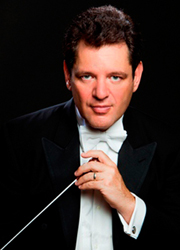
DAVID BERNARD, Music Director of the Park Avenue Chamber Symphony (PACS), Massapequa Philharmonic Orchestra and Eglevsky Ballet, is recognized for his dramatic and incisive conducting in the United States and in over 20 countries on four continents. Mr. Bernard’s recording of Mahler's Symphony #9 with PACS, released in June, 2025 by Recursive Classics, has already received several honors: Clouzine International Music Awards’ Best Classical Conductor; Global Music Awards' Silver Medals in two categories: Symphony Music and Orchestra Performance: Conductor/Orchestra; LIT Music Awards’ Gold Medals in two categories: Best Orchestra and Best Conductor.
A multiple First Prize winner of the Orchestral Conducting Competition of The American Prize, Mr. Bernard’s notable recent performances include Beethoven’s Ninth Symphony at Carnegie Hall (“taught and dramatic” Superconductor) and Stravinsky’s Rite of Spring at Lincoln Center for the Performing Arts (“transcendent... vivid... expertly choreographed” LucidCulture). His critically acclaimed discography includes a premiere recording of a new edition of Stravinsky’s Rite of Spring (“committed and forceful...with thrilling moments” Gramophone) and a complete cycle of Beethoven’s symphonies praised for its “intensity, spontaneity, propulsive rhythm, textural clarity, dynamic control, and well-judged phrasing” by Fanfare magazine. Of his recording of Tchaikovsky’s Pathetique Symphony, Gramophone noted, “parts emerge like newly scrubbed details in a restored painting. Bernard and his musicians frequently shed new and valuable light on a thrice-familiar standard.”
Particularly active throughout the greater-New York City area, David Bernard has appeared as guest conductor with the orchestras of Brooklyn, Greater Newburgh, Island, Litha, Putnam and South Shore, as well as the New York Symphonic Arts ensemble and the orchestra of the Manhattan School of Music. He has also led performances with Connecticut’s Greenwich Symphony Orchestra and Iowa’s Dubuque Symphony Orchestra.
As a scholar, Mr. Bernard has served as a member of the Edwin F. Kalmus/Serenissima editorial team with Clinton F. Nieweg, retired librarian of The Philadelphia Orchestra, developing new editions of Stravinsky’s Rite of Spring and The Firebird Suite (1919 version), the latter published in 2016. Additionally, he has published his own editions of Mozart’s Clarinet Concerto and Schumann’s Symphony No. 2. Mr. Bernard has released over two dozen CDs on the Recursive Classics label, albums that are available for purchase, download and streaming worldwide through Amazon, Spotify, Apple Music, Deezer, Presto Classical and Idagio, among others.
David Bernard is widely recognized as an orchestra builder and is sought after for his artistic leadership and innovation in community engagement. Under his leadership as Music Director, both the Park Avenue Chamber Symphony and the Massapequa Philharmonic Orchestra have thrived - with growing audiences, expanded ensembles and increased critical acclaim. His approach to growing new audiences for classical music includes engaging families through area schools, offering multi-media concert presentations and developing a new concert format–“Classical Music from the InsideOut,” wherein audiences sit among the orchestra’s musicians during concerts. Mr. Bernard’s InsideOut concerts with the Park Avenue Chamber Symphony and the Massapequa Philharmonic Orchestra have brought an unsurpassed experience and level of engagement to audiences of all ages and have hailed by WQXR, Newsday, ClassicalWorld and The Epoch Times.
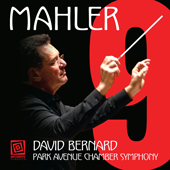 |
MAHLER: Symphony #9 in D with Park Avenue Chamber Symphony Recursive Classics: RC3691873 |
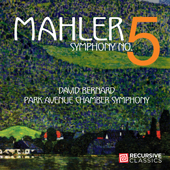 |
MAHLER: Symphony #5 in c# with Park Avenue Chamber Symphony Recursive Classics: RC5956731 |
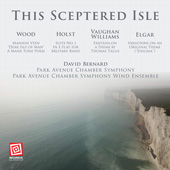 |
“THIS SCEPTERED ISLE” WOOD: Dear Isle of Man with Park Avenue Chamber Symphony Recursive Classics: RC5946217 |
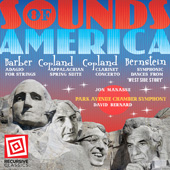 |
“SOUNDS OF AMERICA” Barber: Adagio for Strings with Park Avenue Chamber Symphony Recursive Classics: RC139941 |
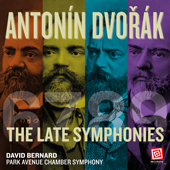 |
DVORÁK: The Late Symphonies Symphony #6 in D, Op. 60 with Park Avenue Chamber Symphony Recursive Classics: RC137552 |
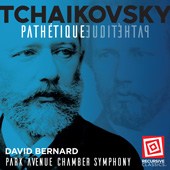 |
TCHAIKOVSKY with Park Avenue Chamber Symphony Recursive Records: RC2059912 |
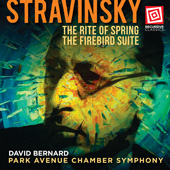 |
STRAVINSKY with Park Avenue Chamber Symphony Recursive Records: RC2057001 |
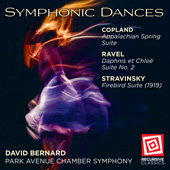 |
COPLAND: Appalachian Spring (suite) with Park Avenue Chamber Symphony Recursive Records: RC2057008 |
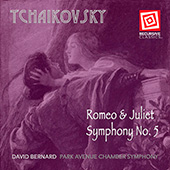 |
TCHAIKOVSKY with Park Avenue Chamber Symphony Recursive Records: RC2057013 |
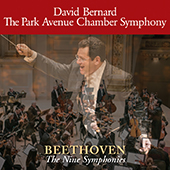 |
BEETHOVEN: The Nine Symphonies soloists: Susanna Eyton-Jones, soprano PACS |
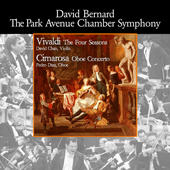 |
VIVALDI: The Four Seasons, Op. 8 soloist: David Chan, violinist CIMAROSA: Oboe Concerto in C soloist: Pedro Díaz, oboist PACS |
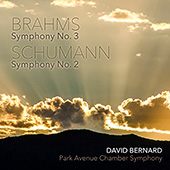 |
SCHUMANN: Symphony #2 in C, Op. 61 with Park Avenue Chamber Symphony PACS |
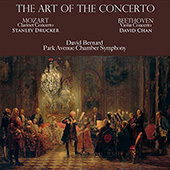 |
MOZART: Clarinet Concerto in A, K. 622 soloist: Stanley Drucker BEETHOVEN: Violin Concerto in D, Op. 61 soloist: David Chan PACS |
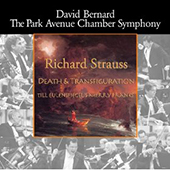 |
STRAUSS with Park Avenue Chamber Symphony PACS |
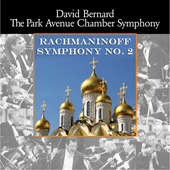 |
RACHMANINOFF: Symphony #2 in e, Op. 27 with Park Avenue Chamber Symphony PACS |
The Nutcracker: A Magical Family InsideOut Concert Experience with Park Avenue Chamber Symphony [headline]
Maestro Bernard, that rare amalgam of scholar, showman, and poet, possesses what one might call the pedagogical temperament of Leonard Bernstein combined with the interpretive depth of the great European tradition. Conducting the entire ballet from memory—a feat that speaks to both his formidable intellect and his profound internalization of this beloved score—he moved between podium and audience with the ease of a master storyteller, his introductory remarks preceding each section transforming what could have been mere musical illustration into a genuine Gesamtkunstwerk—Tchaikovsky’s total work of art that engaged hearts and minds alike. The orchestral playing throughout the afternoon was nothing short of bravura—solid, assured, and brimming with the colors and moods that Tchaikovsky painted with such orchestral brilliance. Images projected on a large screen accompanied the musical journey, creating a multimedia experience that genuinely touched hearts and minds in its delight and sheer enjoyment. In the hands of Bernard and the Park Avenue Chamber Symphony, Tchaikovsky’s score achieves its rightful status as one of the supreme achievements of the balletic repertoire. The orchestration glitters; the melodies soar; and for one magical afternoon at the DiMenna Center, the Land of Sweets became as real as the streets of Manhattan beyond its doors.
OPENING NIGHT
A sincere and considered engagement with Mahler’s inexhaustible score (Symphony #9). Bernard’s ear for textural interplay and contrapuntal transparency yields striking high-definition moments, such as the flute-horn duo in the recapitulation or the overlapping fragments of the Rondo-Burleske, which at times are made to snap into razor-sharp focus. Its chamber music-like clarity aligns well with Bernard’s demystifying yet reverent perspective.
GRAMOPHONE
The performance of Mahler’s Symphony No. 9 by the Park Avenue Chamber Symphony owed much of its emotional and technical success to the intuitive and expressive conducting of David Bernard. Known for his innovative approaches to audience engagement, Bernard’s leadership went far beyond traditional conducting. His ability to interpret Mahler’s complex score with precision and emotional clarity exemplified a rare blend of technical mastery and artistic insight. His comments and introductions prepared the audience for an insightful concert experience.
Moreover, Bernard’s leadership from the podium was characterized by meticulous attention to detail. He demonstrated an acute sensitivity to balance, ensuring that every section of the orchestra could shine while maintaining the integrity of the overall sound. The interplay between the strings, woodwinds, brass, and percussion was remarkably cohesive, creating a unified musical experience that felt dynamic and organic. His clear communication allowed the orchestra to perform with both technical precision and emotional depth, while his passion for the music was palpable in every moment. This synergy elevated the concert into something more than a performance—it became an intimate dialogue between the music, the musicians, and the listeners.
Ultimately, David Bernard’s intuitive and expressive conducting turned Mahler’s Symphony No. 9 into an unforgettable experience, showcasing his skill as a master interpreter of classical music.
OPENING NIGHT
A conscientiously shaped, even towing performance (Mahler Symphony #9). Bernard’s veneration for this solemn orison shines through, a warmly etched performance of staid, emotional power.
AUDIOPHILE AUDITION
Beautifully engineered release (Mahler Symphony #9) with unusual contrapuntal clarity. One can take dictation from the Rondo-Burleske’s sophisticated and spotlit polyphonic interplay. The Adagio stands out for shapely, vocally oriented ensemble playing, intensity, and rhythmic accuracy.
CLASSICS TODAY
One of the best Mahler 9s I’ve heard in several years - deeply moving, well played, handsomely engineered and emotionally satisfying. Bernard’s ‘Adagio’ is emotionally-charged and perfectly paced.
THEARTSDESK.COM
Do not miss this! The performance will get you rehearing the work (Mahler Symphony #9) virtually anew and give you a new understanding. There is a virtually unmatched lyrical sadness and playfulness to the reading, and a real Modern presence to the poetic side here that is something to appreciate.
GAPPLEGATE CLASSICAL-MODERN MUSIC REVIEW
Dvorák’s symphonies are well represented in the recording catalogue, with multiple performances - especially of the late symphonies - featuring seasoned orchestras led by conductors legendary and otherwise. So do we really need another set played by an amateur ensemble under an intrepid music director? Not so fast. More than a few moments in this release of symphonies 6-9 suggest that a fully professional ensemble is being guided by a forceful and insightful conductor. The performances go far in conveying the lyrical effusion, dramatic contrasts and boisterous spirits abounding in these works. The fact that the members of the Park Avenue Chamber Symphony are classically trained but make their livings in other vocations is no impediment to affecting and robust music-making.
GRAMOPHONE
In the first movement [Mahler Symphony #5] Bernard maintains a solid, forward-moving rhythm, the music gradually building into a heady climax. It’s a steadfast, firmly grounded interpretation that eschews histrionics in favor of an unwavering fidelity to Mahler’s intentions. The Park Avenue ensemble is equally up to the task of handling Mahler. The celebrated Adagietto emerges perfectly, conveying Mahler’s obvious affection yet not dipping into sentimentality. It’s a sweet, compelling, and still highly emotional approach. In the Finale, Maestro Bernard lets the work’s effulgent joy shine radiantly through, concluding a thoroughly enjoyable reading. The opening trumpet notes set the stage for sound that has depth, dimension, and spaciousness. It’s clean, transparent sound. Both the audiophile and the casual listener should enjoy the sound.
CLASSICAL CANDOR
Thank you so much to Maestro David Bernard and the Massapequa Philharmonic Orchestra for a memorable Dvorák Concerto! It is always an honor to have the opportunity to revisit this extraordinary work, one of the true pillars of the repertoire. Maestro Bernard was an inspirational collaborator and gave me many new perspectives on the work. Thank you to all who attended!!!
ZLATOMIR FUNG, CELLIST
Pulcinella Suite, Stravinsky’s bold reworking of pieces by the Baroque composer Pergolesi, was played with zest by the admirable Park Avenue Chamber Symphony, conducted by David Bernard.
THE NEW YORK TIMES
There’s a tremendous sheen to these performances of Dvorák’s later symphonies; Bernard and his Park Avenue musicians prove why they’ve won many fans in Manhattan and beyond. The oh-so familiar Ninth stands proud, but I’ve played their lyrical Eighth on loop. ★★★★
BBC MUSIC MAGAZINE
Is David Bernard one of the great conductors of the 21st century? The four releases by Bernard and his Park Avenue Chamber Symphony that I’ve reviewed over the past year lead me to think so. He is a conductor who can find something fresh to reveal in even the most familiar works, not by doing anything especially eccentric but through a combination of intensity, spontaneity, propulsive rhythm, textural clarity, dynamic control, and well-judged phrasing. Any of those four releases could have found a place on my Want List, but the one that deserves precedence is his traversal of the nine Beethoven symphonies, a milestone for any conductor. The performances in this set range from persuasive to extraordinary. The riveting realization of the mighty Ninth falls into the latter category.
FANFARE
AN AFTERNOON OF SWEETS AND DELIGHTS with the Eglevsky Ballet [headline]
The Massapequa Philharmonic under the direction of David Bernard regaled the audience with the music of Tchaikovsky. Throughout the performance, I felt as if I were listening to a pre-recorded sound track because it was so smooth. What a wonderful addition and elevated element for the audience! Balletomanes and all ballet enthusiasts need not travel to Manhattan to experience a Nutcracker. The choice of Long Island’s Tilles Center for the Performing Arts was the ‘perfect’ venue. On a scale of #1-10, I give this a definite #12.
BROADWAYWORLD.COM
One may miss the sonorous heft and large-scale dimensions of classic full-orchestra [Tchaikovsky] Pathétiques from Karajan, Mravinsky and Solti, yet Bernard and his musicians frequently shed new and valuable light on a thrice-familiar standard, abetted by a recorded ambience that evokes concert-hall realism.
GRAMOPHONE
My favourite recent Beethoven cycle is a largely unnoticed one from Copenhagen. This disc of No 9 is another outsider. As a performance, it’s a winner: dramatic, witty, eloquent and boasting some startling choral work in the last movement. The finale is outstanding: the moment early on where bass Brian Kontes encounters the combined forces of the New Amsterdam Singers, the West Point Glee Club and the Young New Yorker’s Chorus is an exhilarating surprise. The massed singing has thrilling weight and immediacy. Tenor Cameron Schutza is a standout among Bernard’s excellent quartet of soloists. There’s a refreshing absence of bombast at the close, and an abundance of uninhibited joy. Well worth investigating.
THEARTSDESK.COM
Saturday afternoon at Newburgh’s Downing Park, the Greater Newburgh Symphony Orchestra held its annual free summer concert, conducted by David Bernard, the first of four candidates to be the next maestro. He chose as his theme “Opera Goes Pops” to show the lyric drama of opera music to embody emotions and tell stories. Bernard introduced each piece with its history and meaning to make the large family audience aware of opera’s power and appeal. His direction was personable, concise and at ease. Musicians and listeners were in tune with him from start to finish.
TIMES HERALD-RECORD (Middletown, NY)
A charming well-prepared performance. Bernard chose a stylistically well-balanced program, one that presented music from three different centuries. The performance of Shostakovich’s challenging Fifth Symphony was very impressive.
NEW YORK CONCERT REVIEW
David Bernard did an excellent job of conducting the world premiere of my piece Aha! in Avery Fisher Hall. With great enthusiasm and diligence, David communicated the rhythmic intricacies of the music to the musicians in rehearsals, and he worked efficiently in the time he had to inspire and instruct the orchestra. I was very pleased with his grasp of the new score and his ability to bring out details as well as shape the large phrases. David brought a fine-tuned sense of balance and color to the music, and his energy infected the players in the best possible way. It was a fine experience, and I would welcome another opportunity to work with him.
BRUCE ADOLPHE, Composer
The Park Avenue Chamber Symphony’s performance of Beethoven’s Eighth Symphony was captivating throughout; the clarity of rhythm and the musical conviction of the players were superb in what was a sparkling account. Music Director David Bernard made the most of Beethoven’s melodic material by emphasizing the shape of the musical line. All dynamics were presented with great contrast, but Bernard also brought out the nuanced Haydnesque elements in the music: the humor, the grace, the lightness of touch in the orchestration, and he emphasized the Viennese dance music that permeates the score.
NEW YORK CONCERT REVIEW
David Bernard is a fine conductor who achieves a great rapport with the ensembles he conducts. His musical ideas are sound and convincing and his rehearsal style is courteous, clear and encouraging. The New Amsterdam Singers had a rewarding experience singing the Mozart Requiem under his direction.
CLARA LONGSTRETH, Music Director, The New Amsterdam Singers
A riveting and stellar performance on all fronts. Music Director David Bernard, who led the performance while playing the harpsichord, did an excellent job of maintaining solid ensemble-playing and consistently driven tempos in what was a crisply articulate, high-energy account [Vivaldi The Four Seasons]. A memorable performance, Bernard conducted the Gloria from memory and with an astute ear for phrasing and color.
NEW YORK CONCERT REVIEW
Mr. Bernard has a great gift for empowering the musicians in his orchestras to perform to their best abilities without sacrificing his required control as a conductor. As simple as this seems, it is actually a very rare combination of skills found only in the best of conductors.
SHEM GUIBBORY, First Violinist, The Metropolitan Opera Orchestra
Towering, Epic Majesty from the Park Avenue Chamber Symphony [headline]
David Bernard conducted from memory; he has these pieces [Beethoven Symphony #4; Mahler Symphony #1] in his fingers, leading the orchestra with a vigorous meticulousness, bolstered by a confidence that there were no limits on where this music might go, from a whisper to a scream. Employing the entirety of the sonic spectrum, the orchestra responded with a frequently exhilarating performance.
LUCID CULTURE
New York City has lots of big attractions that people around the world are well aware of. But New York City also has smaller gems that don’t get the same attention but still shine just as brightly. The Park Avenue Chamber Symphony is one such gem. This superb ensemble, led ably by David Bernard, delivered an impressive performance of Beethoven’s Symphony No. 2, which many, more well known and well funded, orchestras would be jealous of.
BWW CLASSICAL WORLD.COM
Where is the fireworks vibrantly exist is in the [Tchaikovsky] Symphony No. 5. David Bernard brings together all elements of orchestral virtuosity throughout the score. The opening Andante - Allegro con anima pulsates with energy and riveting strength; the fugato tosses and tussles with convincing fussiness. The first horn in the subsequent Andante cantabile is warm, soft and formed. Within the Symphony’s third movement Tchaikovsky’s transitioning hemiola techniques creates a bit of teasing frivolity that’s especially well highlighted under Mr. Bernard’s direction. In the Finale we find the brass in their finest, polished glory; violins are patriotically perky and flounced in the coda. The sound is well balanced, captivating and breathless.
CONCERTONET.COM
Bernard is an exceptional conductor. This album will grab you from the first notes of Bartók’s Dance Suite and never let you go until the finale of the Firebird Suite. His performances are marked by a strong sense of the music’s structure, an outstanding feeling for orchestral texture and phrasing, and a dynamic rhythmic propulsion that makes itself felt even in quiet passages. I have seldom, if ever, heard a performance of Appalachian Spring as good as this. It is finer than such famous past performances as Serge Koussevitzky’s or the composer’s own recording. It is, quite simply, stupendous in every respect, and I should add that the sonics in toto are absolutely mind-boggling. This is an essential recording. No matter how many other versions you may own of these works, Bernard’s readings will be at or near the top of your list.
FANFARE
There are scores of decent recordings [Stravinsky The Rite of Spring] around. Why should this one be worthy of attention, played by a semi-professional New York orchestra? The playing is impressive, the lean, clear sonorities are an asset, and the finer details hit home with pleasing immediacy under David Bernard’s baton. This performance is a zinger. Good, clear recorded sound.
THEARTSDESK.COM
Maestro Bernard leads with a deft hand, and always seems to demonstrate a stylish precision. When [Copland’s]Simple Gifts arrives, we expect it to be something special, and it is. Bernard and his team avoid sentimentality and play it with joy and love. Bernard ensures that Ravel's score [Daphnis et Chloe, Suite No. 2] exudes the proper fairy-tale magic and mysticism it deserves. The textures are always lush and luminous, the story unfolding at a steady but not insistent pace. When the excitement develops, it, too, is properly judged--not too indulgent, not too overdone, yet with conviction and sprightly animation. [Stravinsky]: Under Bernard's direction, this is one of the most satisfying Firebird Suites I've heard.
CLASSICAL CANDOR
The [Rachmaninoff] Symphony No. 2 opened with perfect security, authentic sweep, validity, and individuality. The ensemble masterfully conveyed the work’s appealing, strong Russian qualities, enriched by its suffusion of old forms and highly personal characterizations of the composer’s psyche and imagination. The composer’s memorable orchestral apexes and enraptured the audience, including an elaborate journey of development and recapitulation thundering toward the resounding coda in the final Allegro vivace movement. In addition to crisp, precise sectional work, marvelous solos were all around, including the concertmaster, woodwind chairs, and many more. Bernard’s conducting was clear, expressive, compelling, and marvelously understated–there were no dramatic gesticulations of visual melodrama from the conductor’s podium.
OPENING NIGHT
| 9/14/2025 (3pm) | MASSAPEQUA PHILHARMONIC ORCHESTRA (NY) Tilles Center for the Performing Arts (Greenvale) Jaws in Concert |
| 10/26/2025 (3pm) |
MASSAPEQUA PHILHARMONIC ORCHESTRA (NY) Alfred G. Berner Middle School Auditorium “A John Williams Celebration” |
| 11/22/2025 (2&5pm) |
PARK AVENUE CHAMBER SYMPHONY (NYC) Mary Flagler Cary Hall, The DiMenna Center for Classical Music Saint-Saëns: Piano Concerto #2 |
| 12/7/2025 (3pm) |
MASSAPEQUA PHILHARMONIC ORCHESTRA (NY) Alfred G. Berner Middle School Auditorium “A Holiday Celebration” |
| 12/13/2025 (2pm) |
PARK AVENUE CHAMBER SYMPHONY (NYC) Mary Flagler Cary Hall, The DiMenna Center for Classical Music “InsideOut Concert”| |
| 12/20/2025 (1&6pm) 12/21/2025 (2pm) |
EGLEVSKY BALLET Tilles Center for the Performing Arts (Greenvale) Tchaikovsky: The Nutcracker |
| 1/21/2026 (7:30pm) |
MASSAPEQUA PHILHARMONIC ORCHESTRA (NY) Tilles Center for the Performing Arts (Greenvale) |
| 2/7/2026 (2&5pm) |
PARK AVENUE CHAMBER SYMPHONY (NYC) Mary Flagler Cary Hall, The DiMenna Center for Classical Music Schubert: Symphony #8 |
| 3/15/2026 (3pm) |
MASSAPEQUA PHILHARMONIC ORCHESTRA (NY) Alfred G. Berner Middle School Auditorium Stravinsky: Pulcinella (suite) |
| 4/26/2026 (3pm) |
MASSAPEQUA PHILHARMONIC ORCHESTRA (NY) Alfred G. Berner Middle School Auditorium Tchaikovsky: Romeo & Juliet |
| 5/16/2026 (2&5pm) |
PARK AVENUE CHAMBER SYMPHONY (NYC) Mary Flagler Cary Hall, The DiMenna Center for Classical Music Strauss: Don Juan |
| 5/31/2026 (3pm) |
MASSAPEQUA PHILHARMONIC ORCHESTRA (NY) Alfred G. Berner Middle School Auditorium Prokofiev: Peter & the Wolf |
| 6/14/2026 (8pm) |
PARK AVENUE CHAMBER SYMPHONY (NYC) Merkin Concert Hall. Kaufman Music Center Special Music School Concerto Showcase |
| 7/12/2026 (3pm) |
MASSAPEQUA PHILHARMONIC ORCHESTRA Tilles Center for the Performing Arts (Greenvale) Tchaikovsky: Romeo & Juliet |
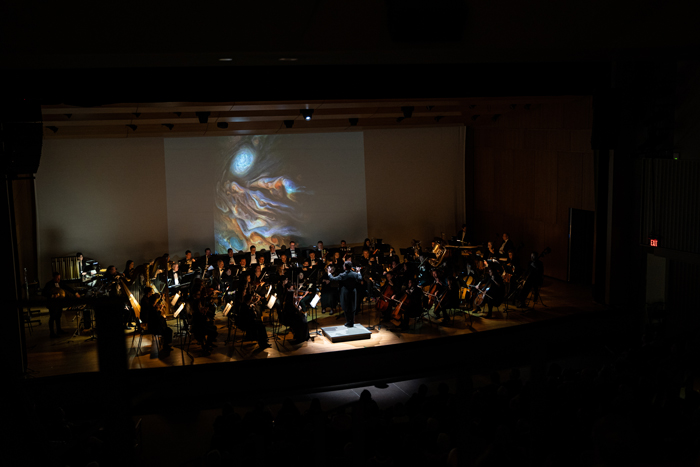
OUT OF THIS WORLD :
MAESTRO DAVID BERNARD and DR. JACKIE FAHERTY
Conductor David Bernard and astrophysicist Jackie Faherty (of the American Museum of Natural History) have developed Out of This World, a new kind of multimedia and multi-disciplinary presentation of Gustav Holst’s The Planets that is captivating audiences and selling out venues.
As maestro Bernard introduces each planet from the musical perspective, Dr. Faherty mirrors the presentation from the scientific viewpoint. Together, they reveal how the science and music complement each other and are fascinatingly, inextricably linked. All of this is illustrated with one-of-a-kind images that make astronomy - and music - come alive. Concertgoers come away feeling like astronomers-for-a-day, carried through our solar system by the unforgettable music of Gustav Holst!
Media Interest: Read Newsday’s profile of the most recent Out of This World here: http://bit.ly/MPONewsdayOutOfThisWorld
